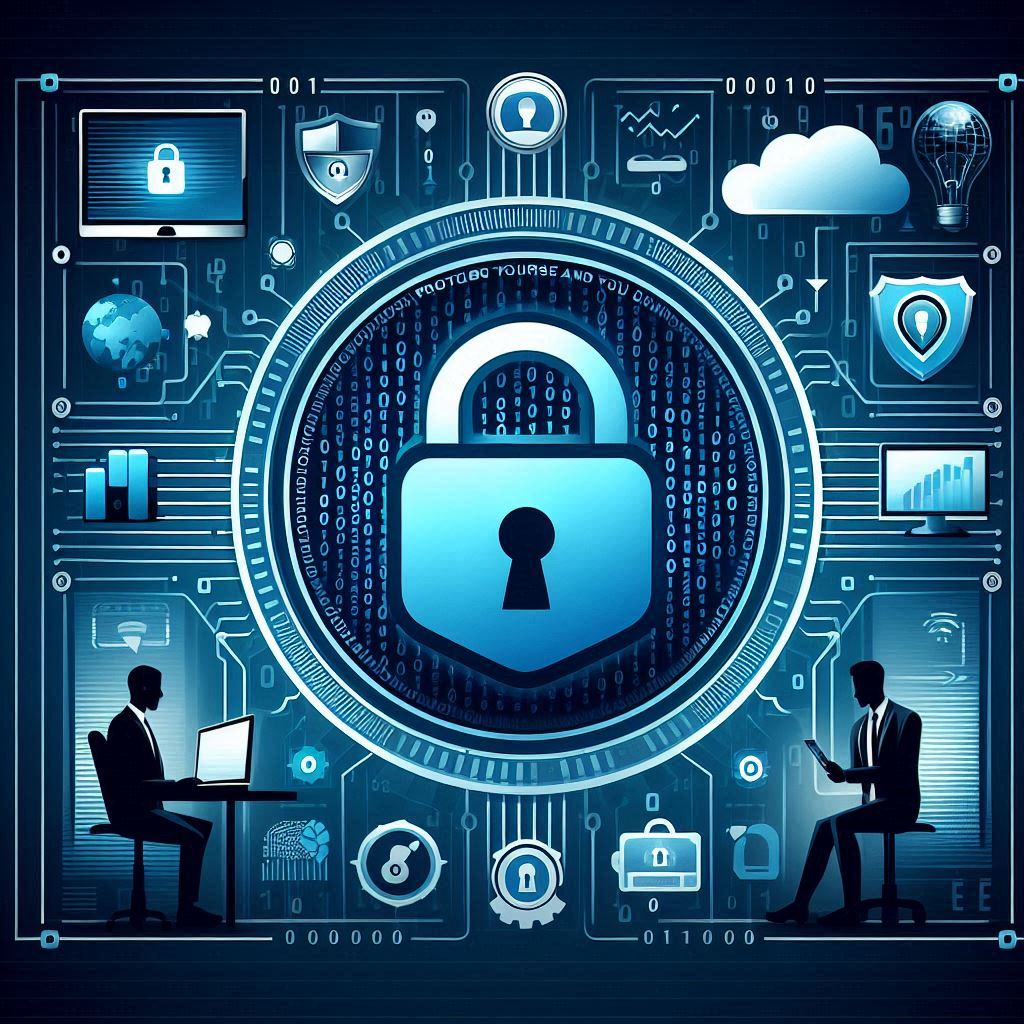
The Importance of Data Security: Protecting Your Digital World
Data security isn’t just a buzzword; it’s a shield that keeps your personal and business world safe in an increasingly unpredictable digital landscape. From cybercriminals lurking in the shadows to simple human error, your data is constantly at risk. The truth is, protecting yourself and your business online isn’t optional anymore—it’s a necessity. You wouldn’t leave your front door unlocked, so why let your digital life be an open invitation? Let’s break down the importance of data security and how you can build stronger defenses in today’s tech-driven world.
What Is Data Security?
Data security refers to the practices, technologies, and processes that are implemented to protect digital data from unauthorized access, corruption, or theft. Whether it’s your personal data, a business’s confidential information, or the sensitive details of an online transaction, securing your data ensures its privacy, integrity, and availability. Data security encompasses various measures, such as encryption, firewalls, secure passwords, and more, all of which work together to safeguard valuable information in the face of a growing number of cyber threats.
Understanding Data Security and Why It’s Critical
Data security isn’t just about locking down sensitive information; it’s the very foundation of trust in today’s digital world. Without proper protection, you expose your personal and business data to hackers, identity thieves, and even potential fraud. The internet, with all its conveniences, also brings risks, and data security is what keeps you safe. With the rise of online transactions, social media, and cloud storage, every bit of information you share online needs to be handled with care.
The importance of data security goes beyond simply protecting usernames and passwords. It's about safeguarding your reputation, privacy, finances, and even your well-being. Think about how much of your personal life is online. From bank accounts to medical records, everything’s on a digital platform, and a breach could spell disaster. In the business world, a data breach could lead to significant financial losses, not to mention long-term damage to customer trust. That’s why understanding the value of online data protection is so critical.
Interestingly enough, many people assume that data security is only a concern for big companies or tech-savvy individuals. But, as a matter of fact, cybersecurity should be a concern for everyone—individuals, families, and businesses alike. No one is exempt from the risk of a cyber attack. The key is adopting strong digital security practices to ensure that your data, whether personal or business-related, stays safe.
Common Cybersecurity Threats to Watch Out For
When it comes to protecting your data, knowing the threats is half the battle. The cyber world is full of predators, and the most common attacks aren’t as far-fetched as they may seem. In fact, they’re likely something you've already encountered or heard about. One of the most prevalent forms of attack is phishing. Scammers send fraudulent emails that appear to come from legitimate sources, tricking you into revealing sensitive data like passwords, credit card numbers, or social security details.
Another major threat is ransomware. This nasty piece of software locks your files, holding them hostage until you pay a ransom. It’s an issue that’s increasingly targeting businesses of all sizes, and even individuals aren’t immune. Once your files are encrypted, your personal or business data could be wiped out unless you pay up. For businesses, ransomware attacks can be devastating. Companies could lose customer data, intellectual property, or even their entire digital infrastructure.
Then, again, there’s the classic data breach, which occurs when hackers gain unauthorized access to systems and steal information. These can involve millions of people’s data, and the aftermath is often catastrophic. It’s not just about financial losses; breaches can destroy a company’s reputation and customer loyalty. To prevent these risks, businesses and individuals alike need to prioritize cybersecurity measures like firewalls, antivirus software, and routine security audits.
The Role of Online Data Protection in Your Daily Life
Online data protection doesn’t just matter to tech experts or large corporations—it’s something we all need to consider as we go about our daily lives. From logging into your social media accounts to shopping online, every action involves personal data being transferred or stored somewhere in the digital ecosystem. This makes it incredibly easy for hackers to steal data or access private information if it’s not adequately protected.
Let’s take a moment to consider online shopping. We’re all familiar with the ease of browsing your favorite store and purchasing items with a click. But behind those transactions lies a vast amount of personal data: your credit card details, shipping address, and purchase history. When a website doesn’t implement secure data protection measures, this information can be intercepted by malicious actors. Without proper encryption, you’re leaving the door wide open to data theft.
On the other hand, digital security can make all the difference. Simple steps, like using strong, unique passwords and enabling two-factor authentication, can go a long way in keeping your data safe. The best part? These actions aren’t hard to implement, and they significantly reduce the risk of a data breach. By protecting your personal information online, you're reducing the chances of becoming a victim of fraud or identity theft.
How to Safeguard Personal Data: Simple Steps for Everyone
Protecting your personal data doesn’t need to be complicated. It starts with simple, everyday habits that can make a world of difference. First off, password security is paramount. The stronger your passwords, the less likely it is that someone can guess or crack them. Avoid using the same password across multiple sites, and make sure to use a combination of letters, numbers, and symbols. Password managers can help you create and store complex passwords securely.
Next up, two-factor authentication (2FA) is one of the easiest ways to add an extra layer of protection to your accounts. Even if a hacker gets hold of your password, they won’t be able to access your account without the second factor—usually a code sent to your phone or email. It’s a small step that makes a huge difference in protecting your online accounts.
One more simple yet effective way to improve online data protection is to regularly update your software. Many people skip over updates, but they’re essential for fixing security vulnerabilities. Whether it’s your operating system, apps, or browser, staying up-to-date ensures you're using the latest security patches.
Data Security for Businesses: Why It’s a Game Changer
For businesses, data security is a game-changer. When your business holds sensitive information—be it customer data, financial records, or proprietary information—you’re not just responsible for protecting your own data; you’re also safeguarding the trust of your clients. A single data breach can ruin your company’s reputation and cripple your operations. Implementing strong cybersecurity measures is more than just a precaution; it’s a strategy for long-term success.
Think about the consequences of a cyber attack: financial losses, a damaged reputation, loss of intellectual property, and the potential legal ramifications. For small businesses and startups, the stakes are even higher. Many businesses lack the resources to recover from a serious data breach. That’s why investing in digital security is not just necessary—it’s an investment in your company’s future.
By integrating advanced data protection strategies, businesses can build customer trust. Secure systems allow companies to provide better services, protect sensitive data, and mitigate the risk of fraud. A business that values its customers’ data will earn their loyalty and stay ahead of competitors.
How to Protect Your Business Data from Cyber Attacks
When it comes to defending your business data, proactive cybersecurity is the name of the game. One of the first things you should do is implement an encryption system for all sensitive data. Whether it's customer information, employee records, or business transactions, encrypting the data ensures that only authorized individuals can access it. This means that even if a hacker intercepts the data, they won’t be able to read it.
Next, ensure your employees are trained in digital security best practices. Human error is often the weakest link in cybersecurity, so educating your team about common threats—like phishing emails or weak passwords—is crucial. By fostering a culture of security awareness, businesses can reduce the likelihood of successful cyber attacks.
Finally, consider using firewalls and antivirus software to block unauthorized access to your company’s systems. Regularly updating and monitoring these tools can help you catch threats before they have a chance to cause harm. Remember, cybersecurity isn’t a one-time fix; it’s an ongoing effort.
The Importance of Encryption for Digital Security
Encryption is a fundamental part of digital security. Simply put, encryption scrambles your data into unreadable formats that can only be decrypted with a key. This ensures that even if hackers manage to access your data, they won’t be able to interpret or use it. Whether it’s email communication, files on your computer, or transactions made online, encryption adds an impenetrable layer of defense.
For businesses, encryption is critical in protecting customer data. With so much personal information being stored and processed online, using secure encryption methods helps prevent financial theft and identity fraud. Without encryption, businesses risk losing the trust of their customers and exposing themselves to potential legal consequences.
From a personal standpoint, using encrypted messaging apps or secure browsing methods ensures that your private conversations and online activities remain confidential. In a world where privacy is increasingly under threat, adopting encryption is one of the best ways to secure your online data protection.
Building Strong Passwords: The First Line of Defense
A strong password is your first and most basic line of defense when it comes to data security. Weak passwords, like “123456” or “password123,” are an open invitation for hackers. Always use complex, unique passwords for each of your accounts, and consider using a password manager to store them securely.
Conclusion
In today’s digital world, data security isn’t just a nice-to-have; it’s essential. From protecting personal information to safeguarding your business from cyber threats, the importance of securing your data cannot be overstated. We’ve covered how to protect your personal information, defend your business against attacks, and embrace simple steps like strong passwords, encryption, and regular software updates to stay safe online. Remember, in a landscape full of threats, a proactive approach to data security is your best defense.
Now, it’s your turn! Don’t let your digital footprint go unprotected. Take charge of your online data protection today—start with a few simple changes and stay vigilant. If you found this post helpful, share it with your friends, family, or colleagues, and let’s spread the word on the importance of securing what matters most. Stay safe, stay protected!
FAQ
1. Why is data security important?
Data security is crucial because it protects your personal and business information from cybercriminals, fraud, and other online threats. Without proper security, your sensitive data is vulnerable to theft, misuse, and loss.
2. What are the most common cybersecurity threats?
Common threats include phishing, ransomware, and data breaches. These attacks can lead to identity theft, financial loss, and the destruction of critical data.
3. How can I protect my personal data online?
Simple steps to protect your personal data include using strong, unique passwords, enabling two-factor authentication, and keeping your software up to date. Avoid sharing sensitive information on unsecured websites.
4. How can businesses protect themselves from cyber attacks?
Businesses can protect themselves by implementing encryption systems, training employees on digital security, using firewalls and antivirus software, and regularly updating security tools.
5. What is encryption and why is it important?
Encryption is the process of converting data into a secure format that only authorized users can access. It is essential for protecting sensitive information, especially during online transactions and communication.
6. What should I do if my data is compromised?
If your data is compromised, immediately change your passwords, report the breach to relevant authorities, and monitor your accounts for any suspicious activity. You may also want to use identity protection services.
If you have any additional questions, feel free to reach out in the comments or share your thoughts on this important topic!
Comments (0)
Categories
Recent posts


Building Confidence in Technology: ...
8 Feb 2025




